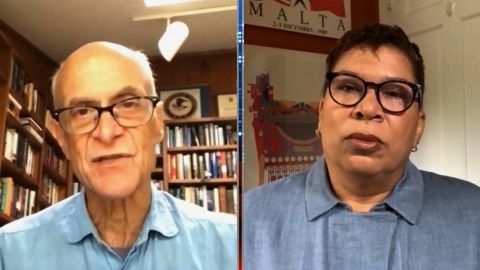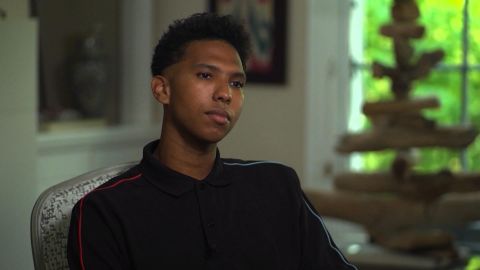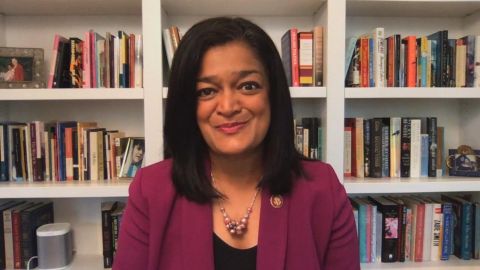Read Transcript EXPAND
CHRISTIANE AMANPOUR: Our next guest, Michael Chertoff, was the secretary of homeland security under President George W. Bush. Here he is speaking to our Michel Martin about the looming specter of yet more election interference.
MICHEL MARTIN: Thanks, Christiane. Mr. Secretary, thank you so much for joining us.
MICHAEL CHERTOFF, FORMER U.S. HOMELAND SECURITY SECRETARY: My pleasure.
MARTIN: There’s news this week. The Senate Intelligence Committee released its fifth and final report about 2016. And the committee concludes, after 3.5 years of investigation, that the Russian President Vladimir Putin personally ordered the effort to hack the Democratic Party networks and to leak information damaging to Hillary Clinton, and the Trump administration made aggressive efforts to take advantage of that fact. We know now that the Russian government isn’t the only hostile foreign power attempting to manipulate our elections. All these years later, is the U.S. government doing anything about that.
CHERTOFF: Well, let me say, first of all, I think this Intelligence Committee report is really commendable. It’s very thorough. It puts in context of things which the Mueller report alluded to, but the Mueller report was narrowly focused on a legal issue. This is a much broader focus on counterintelligence. And I think, while it doesn’t surprise me — I have known all this for some time, as most people have — it lays it out with great specificity, and that’s very, very valuable. I think that the Russians, of course, for decades have used disinformation to try to undermine the West. And what’s happened is, they have gotten adept at using social media in order to amplify the messages they’re trying to send. The government, I think, is doing some things about this. My old agency, DHS, there’s a unit called CISA, Cybersecurity Infrastructure Security Agency. And they are working with the election officials to help shore up the cybersecurity, and they’re also working with the private sector to call out these disinformation efforts. I should also tell you, Michel, I am on the advisory board of something called CyberDome, which is a nonprofit bipartisan that is offering free cybersecurity to campaigns. So you have a combination of people in the government and outside the government, and particularly outside the government, working together to try to push back against this disinformation offensive.
MARTIN: The report, though, makes clear that the Trump campaign didn’t seem to have a problem with this. And now this is the president of the United States. So, what does that tell us about his concern about this and what role his campaign even now maybe playing to repel these kinds of efforts?
CHERTOFF: Well, it’s clear President Trump has been pushing back since the election on the idea of the Russians somehow interfered, which, of course, is totally contrary to all the facts and all the evidence we have seen repeatedly. It’s also clear, if you read the Senate — the bipartisan Senate intelligence report, that elements of the Trump campaign certainly encouraged and wink-winked at what they must have understood, yes, was a Russian effort to interfere with the election. And you see that with Manafort. You see it with Stone. It’s not necessary to sign a contract with the Russians. Anybody who looked at the tea leaves could have seen what the Russians were trying to do. And we do see that these individuals were signaling that they would be receptive to Russian interference, and that the Russians would benefit from that. And my concern is that we’re going to see a rerun of that this time, although the good news is, because, in the private sector, and particularly in the states, people are more alert to this, the Russians may have to be somewhat more restrained in how active they are.
MARTIN: You’re working on a task force, a bipartisan task force, on election crises. What are some of the other issues that you’re addressing with this group? It’s a very interesting group, because, unusually, it has — it’s not just bipartisan. It has people from different sectors, like the activist sector, for example, who aren’t often invited to participate in these kinds of high-level confabs. And I just want to know, what is the focus of your work right now, especially given that, as we said, the election is soon upon us?
CHERTOFF: Well, I think it’s to see that the election allows for people who are eligible to vote to vote, that we get the votes counted, and, if it takes a little longer, that we accept and are patient about it, and that, if there’s going to be a transition of power, that it be orderly and responsible and in accordance with the law. And one of the things which we have acknowledged in the task force is that, while we’re obviously concerned about foreign interference, domestic disruption is itself an issue. For example, there are concerns that you might have ideologically motivated Americans trying to go to polling classes and disrupt, or people getting online and trying to scare people away from voting in person because of the pandemic, which is, of course, a real issue. And that’s why we want to see the maximum opportunity for people to cash their ballots, whether it be by mail, whether it be by drop box, or whether it be by standing in line, in a sanitary and properly run polling place. The idea is to let people be exercising their democratic rights.
MARTIN: What mechanism do you have to ensure that that occurs, other than shame? I mean, shame seems to have played a role in getting the head of the Postal Service to back off from his efforts to make certain changes, which he says were for business reasons, but which many of his critics say were clearly intended to make it more difficult for certain people to vote. And the president has made no secret of the fact that he’s very interested in having some people vote and having other people not. So, given that, does your committee have any tools, other than shame?
CHERTOFF: Well, the main tool, I think, is to work with state and local officials. A strength, although sometimes an obstacle, to having a well-run election is that there isn’t a single federal official or agency that runs elections. So, if we get the secretaries of state and the state governments, for example, to extend, to some degree, the time within which people can vote, if we get them to make ballots available on a wide scale, if we get them to create drop boxes and multiple polling places, all of those are things that can be done by state officials. And I think giving them the legal tools and the understanding of the capabilities that they have at their disposal is the most effective way to promote a free and fair election.
MARTIN: Mr. Secretary, I don’t think it’s a secret that most of the voter suppression efforts that we have seen so far have been directed by the right against the left, specifically against so-called racial minorities, whom they deem to be more supportive of the policies of the Democratic Party, sort of, and the left sort of more broadly. But I’d like to ask you, are there any strategies that you see being employed by the left in order to discourage people, conservatives, from voting?
CHERTOFF: No, I have to say, to my observation, all really based on the right, and particularly there has been, as you said, Michel, a focus on trying to get a minorities list less interested in voting or less capable of voting. I think another thing that’s unfortunately become true is, because some of this online activity allows analysts to pinpoint those particular areas which are more likely to favor a liberal candidate, it’s possible to target certain geographies for disruption. So, for example, if you look at a state like Pennsylvania, the voting pattern in a place like Philadelphia is likely to be much different than the voting in the center part of the state. So, if someone were to try to interfere with voting in Philadelphia by either disrupting the electric system or creating some kind of an outbreak of violence, that would have the effect of skewing the vote for that state, which, of course, is known as a swing state. And that’s one of the reasons I and others are urging state and local officials to be prepared for disruption and have a plan B, so that people can get their votes in, even if it means creating alternative sites or expanding to some degree the time within which people can mail ballots.
MARTIN: I have to ask you about that. You have dedicated much of your life to public service. I mean, you were a Supreme Court clerk. You were a federal judge. You led the Department of Homeland Security in a Republican administration. I assume that you’re a Republican. And just have to ask, what — how does that sit with you to see one of the political parties trying to sort of exert its power through means that you identify as unfair? I’m just wondering, how is that striking you?
CHERTOFF: Michel, it offends me, because I’m an American first. And I was there on 9/11. I was serving as head of the Criminal Division. I saw how, when we were attacked, it wasn’t Republicans and Democrats; it was Americans were attacked. And, in fairness, everybody came together. The idea that a party is being hijacked in order to try to interfere with the fundamental constitutional values that I have spent much of my life defending is very distressing and very disturbing to me. And one of the things I think is very important is for all Americans to mobilize themselves to get to the polls and send a clear statement that we’re not going to have our democracy subverted. Look what’s going on in Belarus now. Look what’s going on in Hong Kong. And I should mention, I’m chairman of the board of Freedom House. Right now, you have people all over the place putting their lives at risk to defend freedom and democracy. And Americans who have always traditionally done that don’t have to put their lives at risk in the same way, but ought to get themselves out of their armchairs and to the polls.
MARTIN: The department that you used to lead, Homeland Security, you have expressed concern about the fact that the department is now being used to advance a political agenda, as opposed to a national security agenda. I know that there are varied views about the conduct of the people who are engaging in street protests in the United States, just to stipulate that. But the reality of it is, these are American citizens who believe, rightly or wrongly, that they are putting their bodies on the line in order to protect American democracy. And we see the Department of Homeland Security has been used to round people up, in some cases using unmarked vehicles, wearing uniforms that don’t have identifiers. What is your response to that?
CHERTOFF: So, I think it was a real error in judgment to send into the field, into the cities people who are trained really to do operations at the border where you’re dealing with violent drug gangs, and who were not trained and equipped and didn’t have rules of engagement that would be more appropriate when you’re dealing with American citizens in cities. And I think we did see examples of excessive force. I think having people wearing camouflage uniforms was a very bad message. And, by the way, we saw in Washington at Lafayette Square in June a similar effort to get the military to play the same kind of a role. But what distressed me the most is this. The president took the opportunity, in fact, to applaud the idea of being as brutal and as aggressive as possible, and in particular said, we’re going to go after cities with liberal Democratic mayors. So, the president used rhetoric that was aimed at essentially labeling the entire exercise as a political exercise, as we saw more recently with the post office, where he talked about curtailing mail-in — the Postal Service in order to affect curtail mail-in ballots. So, he is deliberately messaging a view of how you use the organs of government that suggest they ought to be subordinating to the personal political interests of the president, which is the exact opposite of what the people who swear an oath to uphold the Constitution have dedicated themselves to do.
MARTIN: A number of your fellow Republicans this week, the former Governor of Ohio John Kasich, the former Defense Secretary Chuck Hagel, the former Chairman of the Joint Chiefs of Staff, former Secretary of State Colin Powell, all Republicans, have come out publicly to say that President Trump is unfit, that the country is less safe than it was before he took office, and they will not be voting for him. What about you?
CHERTOFF: Well, I never discuss explicitly my vote, because I believe in a secret ballot, but I will say this. I agree with what they have said that President Trump has made us less safe. He’s alienated our allies. He’s encouraged our adversaries and our enemies. He’s distracted the people who are defending us from the critical work they’re supposed to do. I will also say that, having known and worked with Joe Biden in a variety of capacities, I have a lot of respect for him. I trust him. I believe his heart is in the right place. I may not agree with every policy, but I have no doubt that his primary loyalty and his fidelity is to the Constitution and the people of the United States. So, you can draw your own conclusion. But, to me, the important thing is, we — party is secondary. Our public responsibilities and our country come first. And that is how my vote is going to be cast.
MARTIN: The president has hinted that he will not accept the results of the election if he is not reelected. I don’t know whether that’s just, you now, smoke or just chatter. So, my question isn’t about him. My question is about the people around him.
CHERTOFF: Yes.
MARTIN: If that is the case, what should happen?
CHERTOFF: Well, I think there are two issues. One is whether — and particularly if we have an extended period of time to count the vote, whether ideological allies, right-wing extremists or white supremacists, are being encouraged by him to get out there and be violent, and try to disrupt the country while we’re going through this count process. That’s a matter which will require a swift and strong response from law enforcement, and maybe the National Guard, to defend us against acts of true violence. In terms of whether, come January 20 of next year, once you have the certification by the Electoral College, that the president would refuse to obey the rules, I think what would happen is simply this. The new president, presumably President Biden, would get sworn in. And all of the organs of government would look to him and his appointees for direction. And what would be left would be, whatever Donald Trump thought his power would be, would be like when the emperor of Persia tried to make the seas rise. It wouldn’t have any effect.
MARTIN: Michael Chertoff, thank you so much for talking with us today.
CHERTOFF: My pleasure, Michel. Thank you. Stay safe.
About This Episode EXPAND
Christiane speaks with Carol Moseley Braun, the first Black woman to become a U.S. Senator and Pramila Jayapal, the first South Asian woman elected to the House of Representatives, about Kamala Harris’ historic nomination. She also speaks with photographer Tyler Mitchell about his new book “I Can Make You Feel Good.” Michel Martin talks to former Secretary of Homeland Security Michael Chertoff.
LEARN MORE



